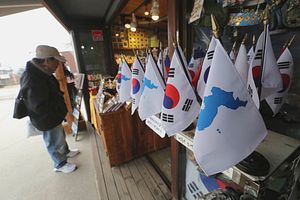On Monday, the Japanese government reacted furiously over an inter-Korean Olympic flag depicting the disputed uninhabited Islands called “Dokdo” in South Korea and “Takeshima” in Japan as part of Korea.
The hoisting of the unified Olympic flag during an exhibition match between the newly formed women’s inter-Korean ice hockey team and Sweden in Incheon, South Korea sparked outcry from the Japanese government, with official protests being lodged at the Japanese embassy in South Korea and South Korean embassy in Tokyo.
Chief Cabinet Secretary Yoshihide Suga said in a press conference on Monday that the situation was “extremely regrettable” and they are waiting for South Korea to “respond appropriately in light of Japan’s territorial rights on Takeshima Island.”
The South Korean Foreign Ministry confirmed today they will forgo the controversial flag, accepting the International Olympic Committee’s recommendation not to politicize sports events. Both South Korea and North Korea are expected to march as one at the PyeongChang opening ceremony under the unification flag, but a version not showing the disputed islands.
At a press conference, South Korean Foreign Ministry representative Noh Kyu-duk alluded to the fact their revision was not propelled by Japan’s opposition but rather affirmed their “basic stance is to respect IOC’s decision for IOC-run events.” He said that while the Japanese Foreign Ministry used diplomatic channels to lodge complaints, the event in question was “separately organized by the Korea Ice Hockey Association.”
In an earlier diplomatic altercation, last month South Korea made calls to the Japanese government to remove a permanent government-sponsored exhibition expressing Japan’s claim over the islands in a newly opened museum in Tokyo. But those calls were rejected by Tokyo.
While South Korea controls the disputed islands, located in the southern Sea of Japan, Japan claims the islands as a part of its sovereign territory. North Korea supports South Korea’s stance. In Japan “Takeshima” means bamboo islands; “Dokdo” means solitary islands in Korean. But despite the tranquil imagery, there has been a six-decade long territorial dispute over the islands. The islets are guarded by approximately 37 South Korean police, Ministry of Maritime Affairs and Fisheries personnel, and lighthouse keepers.
The two tiny, rocky islands are said to be positioned in prime fishing waters and have reserves of natural gas, although the precise amount is unknown. However, it is the symbolic and historical motivations that are driving the uncompromising diplomatic row.
The unification flag has added fuel to the fire, inevitably rubbing Japan the wrong way. The latest row comes after the Moon administration in South Korea called into question a 2015 deal to lay to rest the controversial “comfort women” issue, another perennial stumbling block in Japan-South Korea ties.
President Moon Jae-in has leaped at the chance to pursue the building blocks for peace on the Korean peninsula, but his sports diplomacy comes as the latest setback for Japan and South Korea’s bilateral relationship.

































